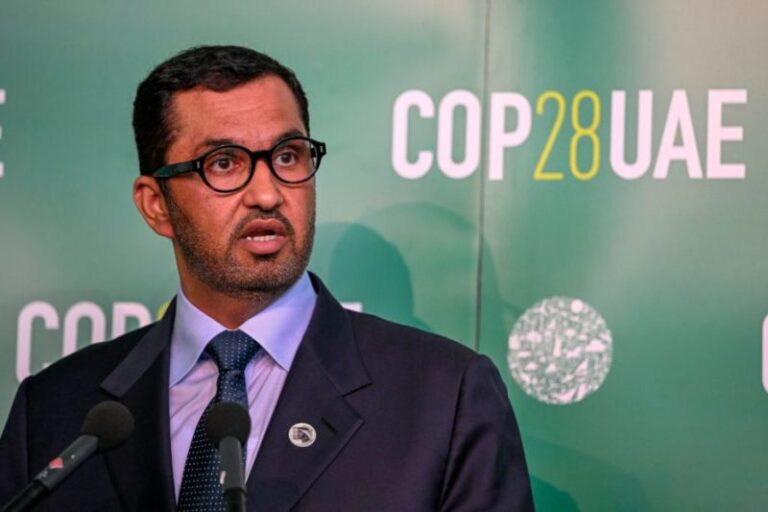Deploying a fully functional fund to compensate poor countries hit by climate change is among the major goals set out for the United Nations COP28 summit that starts in November.
Delegates from the almost 200 countries at the gathering must also set targets for tripling renewables and doubling hydrogen production by 2030, Sultan Al Jaber, president-designate of COP28 and head of Abu Dhabi National Oil Company, said Thursday at a meeting in Brussels.
The annual UN climate summits tend to be large, complicated, diplomatic efforts that require a consensus among all nations attending. Setting out an agenda early is key for successful outcomes.
Al Jaber had come under criticism for not laying out a clear vision for what COP28 should achieve. Crucially, as the head of a major oil company that’s set to increase production, his previous comments on squeezing out fossil fuels were seen as weak.
In Brussels, where ministers and representatives from more than 20 countries gathered for Thursday’s meeting, Al Jaber said a phase-down of fossil fuels was “inevitable” and “essential.”
He also said companies must “attack all emissions” including Scopes 1, 2 and 3, which cover emissions produced directly by the firms and those by customers using their products. For oil and gas businesses, Scope 3 emissions make up more than 80 per cent of the total, and typically don’t feature in their climate plans.
Despite the strong rhetoric, it remains to be seen whether there’s a consensus for pushing out fossil fuels at COP28. Countries such as Saudi Arabia have traditionally blocked such efforts, including at last year’s summit in Egypt. On the other side, environmental groups have been calling for a specific timeline for eliminating oil, gas and coal.
“There’s a large number of other countries that are not yet on board,” Majid Al Suwaidi, director-general for COP28, said in an interview. “There’s a lot of debate over whether a timeline is useful, or even realistic.”
Challenging old models
So far, only a handful of Group of 20 members are doing enough to keep warming to 1.5C — the limit set in the Paris Agreement that would help mitigate the worst effects of climate change — according to researcher BloombergNEF.
“We need to challenge old models that were built for the last century,” Al Jaber said. “This plan is guided by a single north star, and that is keeping 1.5 within reach.”
In attendance Thursday were officials from major emitters such as China, the US and India, while the UK, Australia, Brazil and the European Union also were present.
EU climate chief Frans Timmermans, who has supported Al Jaber’s appointment as COP28 president, said he wanted fossil fuels phased out well ahead of 2050, alongside a rapid rollout of renewables.
In continuing to subsidize polluting fuels, “we are subsidising an attack on all of humanity,” he said at the conference. “We need to avoid that our citizens fall into despair.”
$100bn commitment
As the urgency of climate change has increased, the yearly UN summits have not just grown in importance but also in agenda items, with countries pushing to achieve a longer and longer list of crucial steps. Al Jaber said COP28, which will be hosted by the UAE, must also set out a global goal on adaptation to rising temperatures, while rich countries must fulfil their commitment to provide $100bn in annual climate finance.
“The UAE has taken on a lot of the feedback that people were eager to hear them set out a vision and a forward process,” said Tom Evans, an analyst at climate think tank E3G. “It’s coming later than expected, but it’s a step up.”
Al Jaber also said two environment ministers — South Africa’s Barbara Creecy and her Danish counterpart, Dan Jorgensen — will oversee the so-called global stocktake, where countries assess progress made and what more needs to be done to keep climate commitments.
Their appointments are a sign of determination to get a strong outcome from COP28, Evans said.



